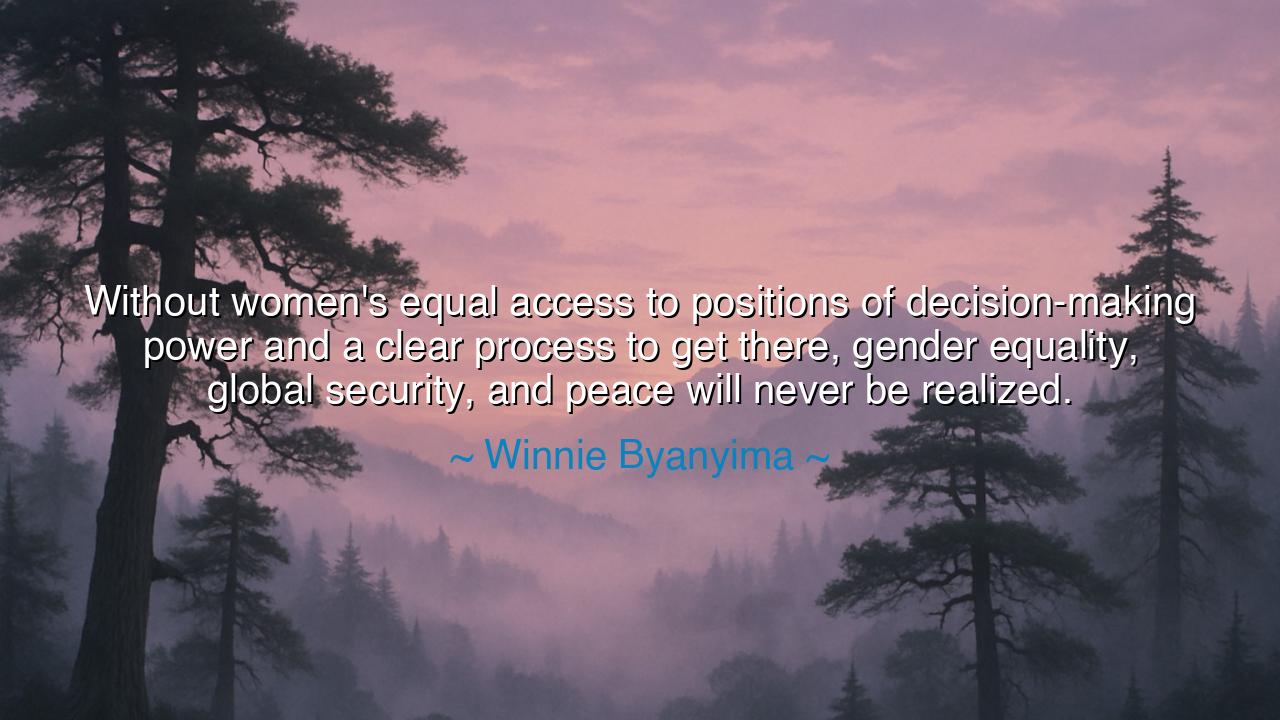
Without women's equal access to positions of decision-making
Without women's equal access to positions of decision-making power and a clear process to get there, gender equality, global security, and peace will never be realized.






The words of Winnie Byanyima, “Without women’s equal access to positions of decision-making power and a clear process to get there, gender equality, global security, and peace will never be realized,” rise like a call to conscience — a truth forged not in comfort, but in the fire of justice. Her voice, strong and unwavering, reminds the world that peace built without the hands of women is not peace at all, but an illusion — fragile, partial, doomed to fall. For equality, she teaches, is not merely a moral ideal; it is the foundation upon which security and peace stand. When women are excluded from the councils of power, the world becomes unbalanced, and imbalance breeds conflict. Her words are not only political — they are spiritual, echoing the ancient principle that harmony cannot exist when half of humanity is silenced.
To understand the weight of her statement, one must know the life from which it was born. Winnie Byanyima, a Ugandan leader, engineer, and advocate for social justice, has walked through the corridors of power and the shadowed fields of inequality. From her work as a freedom fighter during Uganda’s turbulent years to her global leadership in organizations like Oxfam and UNAIDS, she has seen the wounds inflicted when women are denied their rightful place in decision-making. Her words come from experience — from witnessing how nations crumble under the arrogance of male-dominated governance, and how they begin to heal when women’s wisdom is allowed to guide them. To her, equality is not charity; it is necessity, the lifeblood of civilization’s endurance.
The ancients understood this truth long before modern times, though they often forgot to live by it. In the myths of every culture, balance was the law of creation: the masculine and feminine, strength and compassion, reason and empathy, working together to sustain the world. When either force ruled alone, chaos followed. The ancient Egyptians revered Ma’at, goddess of truth and cosmic balance, believing that harmony between men and women preserved the order of heaven and earth. So too does Byanyima speak of balance — not mythic, but real: the balance of voices, perspectives, and leadership that allows nations to thrive. Her warning is clear — without that balance, even the most powerful civilizations will falter, for they are built upon the silence of their mothers and daughters.
History bears witness to her wisdom. When Rwanda emerged from the ashes of genocide in 1994, the nation chose to rebuild differently — by placing women at the heart of its new government. Today, more than sixty percent of Rwanda’s parliamentarians are women, the highest proportion in the world. This transformation was not symbolic; it reshaped the country’s destiny. Women helped design laws that prioritized education, healthcare, and reconciliation. They brought empathy to governance, turning vengeance into rebuilding. Through them, the truth of Byanyima’s words was proven: peace endures only when all have a voice in its making.
Yet, her statement also warns that equality cannot exist without structure. “A clear process to get there,” she says — for access alone is not enough if the path is obscured by prejudice and corruption. Many societies praise women’s potential but fail to build ladders for them to climb. Without policy, education, and cultural change, opportunity remains an illusion. The ancients taught that justice is not a gift; it is an order — something that must be built stone by stone. In the same way, Byanyima calls for the deliberate construction of systems that open doors, nurture leadership, and ensure that women are not guests in power, but architects of it.
Her words speak not only to women but to men — for she calls upon both to restore the broken circle of humanity. Just as no tree can stand with half its roots cut away, no society can stand when half its people are excluded from decision-making. The security of nations is not measured by armies or weapons, but by the justice of their laws and the inclusivity of their leadership. When women lead, the world grows safer, not because they are gentler, but because they understand that power must serve life, not dominate it. Their leadership brings balance — a blend of compassion and courage, logic and intuition, mercy and strength — qualities the ancients believed were the essence of true kingship.
Let this, then, be the teaching carried forward: peace and equality are not destinations, but disciplines. They must be cultivated like a sacred flame, guarded against the winds of greed and pride. Each person, man or woman, must ask: do I create space for others to lead? Do I honor wisdom wherever it is found — even when it challenges me? For as long as power remains a fortress for the few, the world will know neither justice nor peace.
Thus, Winnie Byanyima’s words stand as a torch for generations to come. They remind us that the fate of nations depends not on the strength of their walls, but on the breadth of their inclusion. The ancients would have called this divine equilibrium — the restoration of the feminine and the masculine, of compassion and courage, into harmony. When women walk beside men in leadership, when every voice is heard in the shaping of the world, then — and only then — will humanity find the peace it has so long sought.






AAdministratorAdministrator
Welcome, honored guests. Please leave a comment, we will respond soon